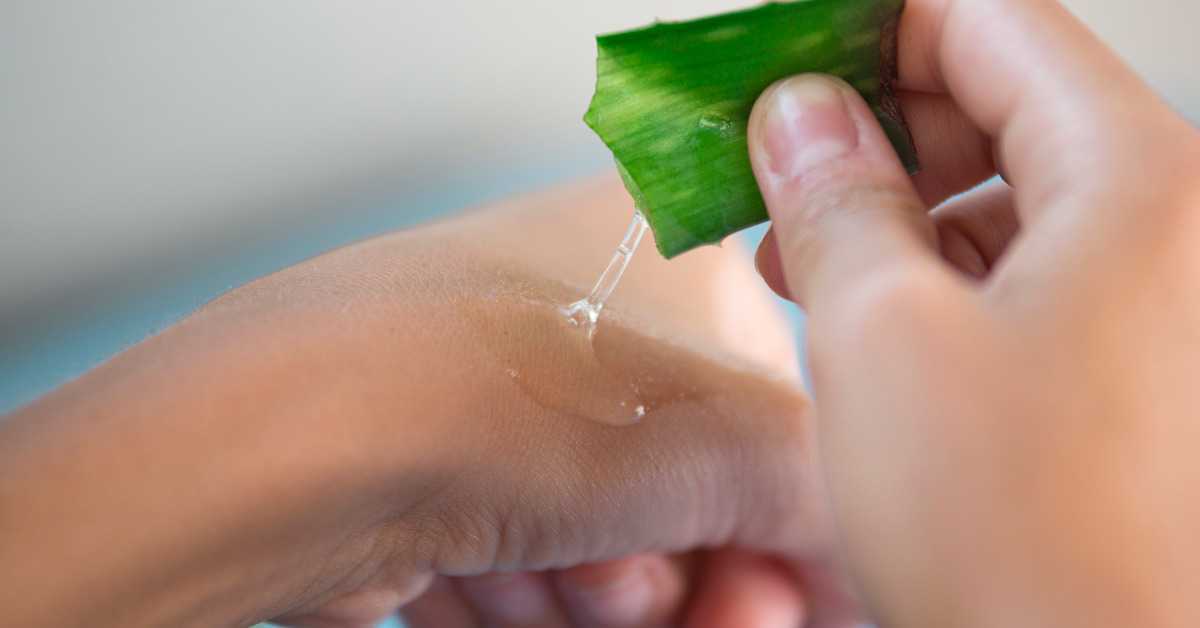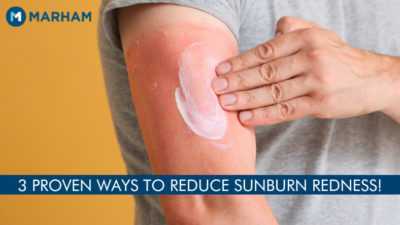Anyone can get a sunburn during these days of high heat. A sunburn can cause redness on the face or the body which can be quite extreme at times.
So, how to get rid of sunburn redness overnight? Find some easy and quick home remedies for sunburn and answers to other frequently asked questions about this condition.
About Sunburn:
According to the Skin Cancer Foundation:
“Sunburn speeds up the ageing process of the skin and is primarily responsible for most occurrences of basal cell carcinoma, squamous cell carcinoma, and melanoma, the most deadly kind of skin cancer.”
Sunburn is caused due to excessive UV (ultraviolet) radiation exposure. Your skin might become burned by UV rays coming from the sun or by artificial sources like tanning beds.
There are three types of sunburns. First and second-degree sunburns are typically treatable at home. Although extremely uncommon, third-degree sunburns require immediate medical attention.
What are the Symptoms of Sunburn?
The symptoms of sunburn include:
- inflamed skin that appears pink or red
- the sensation of hot or heated skin
- small, potentially breakable blisters packed with fluid
- If the sunburn is severe, headache, fever, nausea, and exhaustion
- eyes that are dusty or hurt
- Itching, discomfort, and pain
- swelling
Any exposed body area, including the lips, scalp, and earlobes, is susceptible to burning. If, for instance, clothing has a loose weave that lets ultraviolet (UV) radiation through, even covered parts might burn.
If you or anyone else has these symptoms, it is best to consult a doctor for immediate treatment. You can see an online skin specialist today via the Marham app.
What are the Guidelines for Treating Sunburn?
Some treatment guidelines for sunburn that have been suggested by research are:
- Do not go in the sun: To prevent additional skin damage, avoid the sun.
- Medicines: Reduce pain by using non-steroidal anti-inflammatory drugs.
- Hydration: Drink a lot of water to prevent dehydration.
- Soothing Creams: Avoid using local anesthetic creams and instead use topical creams like hydrocortisone or aloe vera.
- Cool baths: Cool colloidal oatmeal baths might relieve skin irritation.
How to Get Rid of Sunburn Redness Overnight Quickly?


Now, let’s see what you can do about the redness caused by sunburns. Here are some effective methods for how to get rid of sunburn redness overnight:
1. Apply Aloe Vera Gel
Aloe vera may be more successful in treating burns than petroleum jelly or the topical antibiotic silver sulfadiazine, according to research.
Additionally, scientists have found in small research that 97.5% aloe vera gel might lessen skin redness brought on by UV radiation exposure.
Dermatologists say that it is better to use Aloe Vera gel directly from the plant. Just cut its leaves to take out the gel and apply it directly to the irritated area.
You can also use an aloe-containing lotion or moisturizer instead. Choose a product with 100% aloe if you can. Additionally, check to see if the product is fragrance-free; additional smells might aggravate burnt skin.
Also, read How to Use Aloe Vera for Skin Whitening
2. Use a Cold Compress
Sunburns result in skin inflammation and redness, ao one of the quickest and simplest ways to treat discomfort is by applying a cold compress to the affected area.
A direct application of ice to the skin might inflict more damage than good. Instead, prepare the application by placing some ice in a tiny bag and wrapping it in a soft towel.
Do not put the cold compress on the skin for too long and place it in short episodes to avoid problems.
3. Take a Cool Bath
How to Get Rid of Sunburn Redness Overnight? Try a cold bath. To reduce redness you can try showering in cold water as it helps with pain relief.
The American Dermatology Association recommends, gently patting yourself dry while still leaving some water on your skin and applying a moisturizer after that to assist your skin to retain moisture. This could lessen the dryness.
How to Prevent Sunburn?
“One or more bad sunburns increases a person’s risk for skin cancers and skin aging.” -Article from the Cleveland Clinic
It is extremely important to take precautionary measures to protect yourself from sunburn. As it not only increases the aging process but makes you more susceptible to having skin cancer.
Here are some ways you can prevent sunburn:
- Every day, use a broad-spectrum sunscreen to shield yourself from UVA and UVB radiation.
- When outside, reapply sunscreen every 90 minutes; after swimming or with heavy perspiration, more often.
- Avoid tanning beds and the sun.
- When UV rays are at their greatest, between 10 a.m. and 4 p.m., limit your time spent in the sun during these hours.
- Use UV-blocking sunglasses.
- Wear safety gear including long sleeves, long pants, and hats with a broad brim.
- For yearly screenings for skin cancer, visit a dermatologist.
When to Consult a Doctor for Sunburn?
While you can treat sunburns at home, at times they can be quite severe. If you or someone you know has a high fever, a large portion of burnt skin, swelling, or redness, see a doctor.
A dermatologist also known as a skin specialist can help you in this case. They might suggest you some ointments, creams, or any other treatment depending upon your condition.
Can’t Find the App?
| Android | IOS |
|---|---|
  |
  |
FAQs
How long does it take for sunburn redness to go away?
It usually takes around 2-3 days for mild sunburn to get better. However, the time it takes for the redness to go away depends on how bad your sunburn is. So, if you have severe sunburn it might take more than a week to go away.
Why do sunburns get worse at night?
Some people find that sunburns get worse at night. It might be because you are sleeping on rough bedding or wearing clothes made of rough materials. You can switch or try wearing silk or cotton clothes to make this problem go away.
What happens if you put ice on sunburn?
Applying ice to sunburned skin can worsen the problem by inducing significant vasoconstriction. It can cause the blood vessels to contract severely and cut off the local blood supply to the skin’s tissues.

